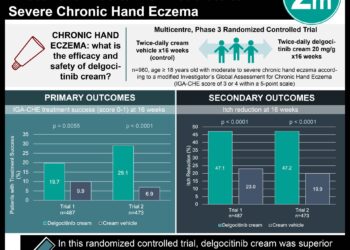Hand dishwashing linked to fewer allergies in children
1. Allergic diseases, such as eczema and asthma, were significantly less prevalent in children whose parents washed dishes by hand rather than by machine.
2. Parents who reported cooking fermented foods and food from farms also had children with significantly decreased odds of developing allergic disease.
Evidence Rating Level: 2 (Good)
Study Rundown: Chronic atopic or allergic diseases among children have been increasing in prevalence. The “hygiene hypothesis” has been touted as a mechanism for allergy protection and immunologic tolerance, working by boosting immunity through early microbial exposure. This study examined the effects of daily practices, such as dishwashing and dietary habits, on allergy development in children. A large sample of Swedish parents completed a questionnaire on dishwashing and dietary habits, as well as allergic diseases diagnosed in their children. Results indicated that children whose parents reported hand dishwashing, rather than machine dishwashing, had a significantly decreased prevalence of eczema and asthma. Furthermore, children whose parents reported cooking fermented foods and food from farms had significantly decreased odds of developing allergic disease. This study is limited by self-reporting bias and possible confounding lifestyle factors, such as socioeconomic status and day care attendance. Nonetheless, these findings support the “hygiene hypothesis” and have implications for curtailing the rising trend of atopy in children via an alteration of lifestyle and dietary habits.
Click to read the study, published today in Pediatrics
Relevant Reading: Exposure to foodborne and orofecal microbes versus airborne viruses in relation to atopy and allergic asthma: epidemiological study.
In-Depth [retrospective cohort study]: Participants included 1029 parents/guardians of children aged 7 to 8 years in Kiruna and Molndal, Sweden. In September 2007, participants filled out a questionnaire – a Swedish version of the International Study of Asthma and Allergies in Childhood (ISAAC). Questions asked about allergic diseases, such as asthma, eczema, and allergic rhinoconjunctivitis (ARC), as well as lifestyle practices, such as dishwashing (by hand vs. by machine) and dietary habits (home cooking, fermented foods, food from farm, and breastfeeding). Principal component analysis was used to analyze the association between various exposure variables and allergy development. Results indicated the dishwashing by hand was negatively correlated with allergy development. Eczema was significantly lower in hand dishwashers than machine dishwashers (23% vs. 36%, respectively, P = .001). Asthma was also significantly less prevalent in hand dishwashers (1.7% vs. 7.3%, P = .011). There was a similar, but nonsignificant, trend in ARC. As for dietary practices, eating both fermented foods and food from farms was associated with decreased odds of having an allergic disease (OR = .53, 95% CI .32-.87 and OR = .67, 95% CI .46-.98, respectively: P < .01).
Image: CC
©2015 2 Minute Medicine, Inc. All rights reserved. No works may be reproduced without expressed written consent from 2 Minute Medicine, Inc. Inquire about licensing here. No article should be construed as medical advice and is not intended as such by the authors or by 2 Minute Medicine, Inc.







